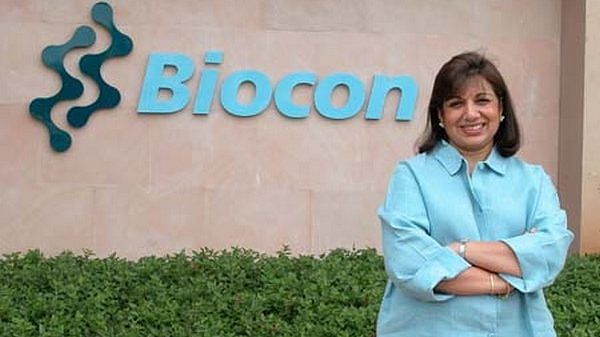New Delhi: Biotechnology can help improve access to and availability of drugs, Biocon founder Kiran Mazumdar-Shaw said Tuesday, a day after the government announced that the Indo-US initiative iCET would expand to include this multi-disciplinary field within its ambit.
The iCET, a framework for cooperation on critical and emerging technologies between the two countries, was announced by Prime Minister Narendra Modi and US President Joe Biden in May last year.
Speaking at Carnegie’s Global Technology Summit Tuesday, Shaw spoke of the many provisions within iCET which could improve accessibility by using biotech, generative AI and more. They could reduce the time and cost of development, and the probability of failure, she said.
“The usual refrain you get from industries is that it’s too expensive to develop drugs, especially with their very high rate of failure. If you can reduce this rate to something insignificant and accelerate the time to reach the market, you can address the question of access and affordability,” she said.
Shaw added that drug regulation was a great place to start as everyone benefited – from healthcare systems to patients. “Investment in healthcare across economies is very high so regulations are the place to begin,” she said.
Shaw believes the world is currently at the “cusp or inflection point of new emerging technologies within biotech”. She referred to various benefits to society, from developing smart foods to more sustainable land use – all through methods such as gene editing, enzyme technology and synthetic biology.
“The social impact of biotech such as enzyme technology, and synthetic biology is tremendous, especially within sustainability. Using these methods, we are in a position to come up with new materials, drugs, energy, biomaterials, smart foods and proteins and more.”
The founder of the global biopharmaceutical company said information technology, specifically data science and generative AI, played a crucial role within biotech. She said that “none of this innovation” would be possible without emerging technologies.
Yet, numerous challenges, including regulatory ones, remain in developing biotech, to ensure safety and efficacy, she said.
Shaw said regulatory processes made taking “ideas from the lab to the market” long and gestational, adding that the process was also expensive, which deterred investment. On the other hand, she said, the results were immediate in the IT sector. Biotech required decades, with a high probability of failure, she said.
Shaw called for a complete rehaul of regulatory processes, critiquing their present dependence on “iterative processes, trial and error and human subjectivity in data interpretation”.
“These iterative processes can be made much more predictable using generative AI and data analytics, which can come up with algorithms to provide greater probability of success and predictability on delivery,” Shaw said.
Emphasising the need for an “ideas economy” and the numerous benefits of using emerging technologies in the sector, such as personalised drugs and more, the Biocon founder criticised the pharma and biotech sectors for being “late adopters of technology due to regulations”.
Shaw further said, “Tech-savvy and skilled regulators are very crucial. Data-led decision-making for regulators will help society get solutions and benefits faster.”
However, while exploring the benefits of AI within biotech, Shaw also focussed on the importance of surveillance and ensuring biohazards were not developed, citing theories around the origins of the COVID-19 virus.
Kiran Mazumdar-Shaw is among the founder-investors of ThePrint. Please click here for details on investors.
(Edited by Tikli Basu)



